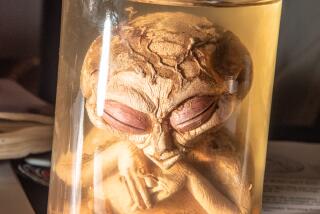In a Universe of Wonders, Remembering to Be Awed
- Share via
A few weeks ago, I received a voicemail message that put a smile on my face a light-year long. The words tumbling out of the machine could barely contain my friend’s excitement; he sounded, in fact, a lot like a child who had just got home from school and couldn’t wait to tell you that butterflies come from caterpillars or that worms can grow their heads back after you cut them off.
Except that my friend is 90 years old, today, and Walter wasn’t calling about worms. He was calling about images he’d seen in The Times from the newly refurbished Hubble Space Telescope.
“They have actually made a picture 120 million light-years away!” he said in a voice still charmingly tinged with his native Vienna. “That’s enough to floor you. It takes my speech away. It’s the most important thing that happens today. I’m very happy to have heard this.”
I too had seen the Hubble pictures. But until I heard from Walter, I had forgotten to be properly amazed.
There ought to be a law, I thought. One simply shouldn’t be allowed to take such things for granted. Perusing the week’s papers, I quickly found a whole new collection of compulsory jaw droppers. Some scientists discovered fossil footprints of foot-long “bugs” that had crawled onto dry land from the sea 480 million years ago; others found a new form of life a mere 400-billionth of a meter in diameter, existing improbably in a roiling undersea vent; still others discovered what they think might be a huge reservoir of water on Mars. If there’s water, was there life? Is Mom a Martian?
A study showed that, genetically speaking, mice and men are barely distinguishable. A telescope produced a detailed image of the universe as it looked 14 billion years ago. The cover of the journal Science featured an image of four-dimensional sheets of space-time floating toward each other like tissues in the wind, preparing to collide and create a universe.
The universe seems to demand that we stay in a state of continual astonishment. Certainly it is an important quality for scientists.
Take the case of another man who celebrates his 90th birthday this year, Princeton physicist John Archibald Wheeler. He coined the terms “black hole” and “quantum foam” and now spends his days working on the question of why the universe exists.
Talking with a reporter recently, he stopped in the midst of contemplating the connection between reality and thought to ponder a rock. “That rock is about 200 million years old,” he said. “One revolution of our galaxy.”
It’s harder than you might think to keep such things in proper focus, given the way our minds work. Anything we look at long enough tends to disappear. This can be a difficult effect to notice, because our eyes constantly jitter around, shaking up images imperceptibly, creating a kind of continual visual surprise. If your eyes stayed fixed, the visual world would begin to melt into a blurry palette of vague shapes.
The same is true of other senses. Whatever drones on long enough goes unheard (if it doesn’t put you to sleep first). We don’t feel our shoes until we take them off. The bathtub water stops feeling hot, and we stop noticing (if we’re lucky) the power lines in the yard.
It’s called adaptation, and we’re pretty good at it.
It keeps us from getting overwhelmed with information, but it also can make us blind. Before we know it, even science writers forget just how remarkable it is to take a picture of an object in the sky millions of light-years away. Whatever it is, is much changed now--whatever “now” means at such a distance.
It occurred to me (and I’m certainly not the first) that scientists can be a surprisingly childlike species. Walter is a retired inventor and engineer who dreamed up some of the fancy optical devices used at Disney’s Epcot Center in Florida.
Whether the subject is stars or bones or molecules or 10-dimensional space-time or just great big beautiful machines, scientists are just like kids showing off--sometimes shoving in front of the other kids to get attention. (Beyond getting a driver’s license, what’s the point of growing up, anyway?)
Don Herbert, television’s Mr. Wizard, once told me that he had to use younger and younger children for his program, because once they hit puberty, they become too self-conscious to let their curiosity just hang out. As they get older, it becomes hard for them to ask those deceptively innocent questions, such as the ones Wheeler wonders about: Is the universe here (or there) when nobody’s looking at it? Wheeler thinks not. What’s more, he thinks that the act of looking is what brings the universe into existence.
So, here’s looking at you, Walter.
And happy birthday.
Readers can reach K.C. Cole at kc.cole@latimes.com






